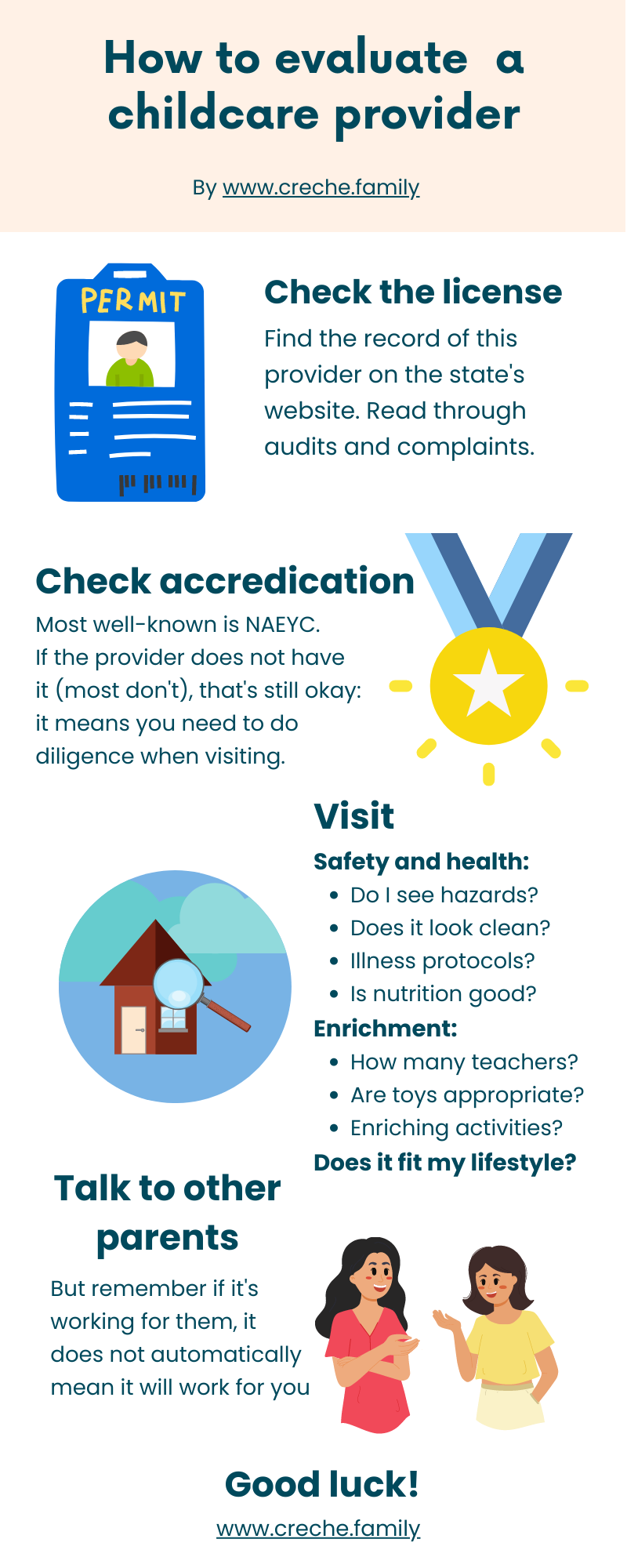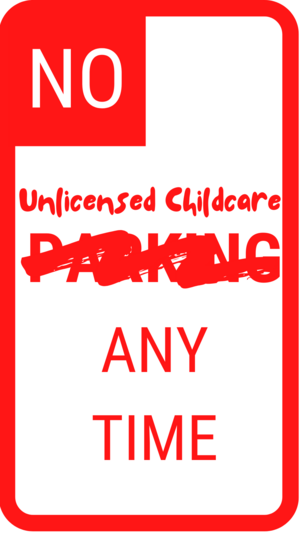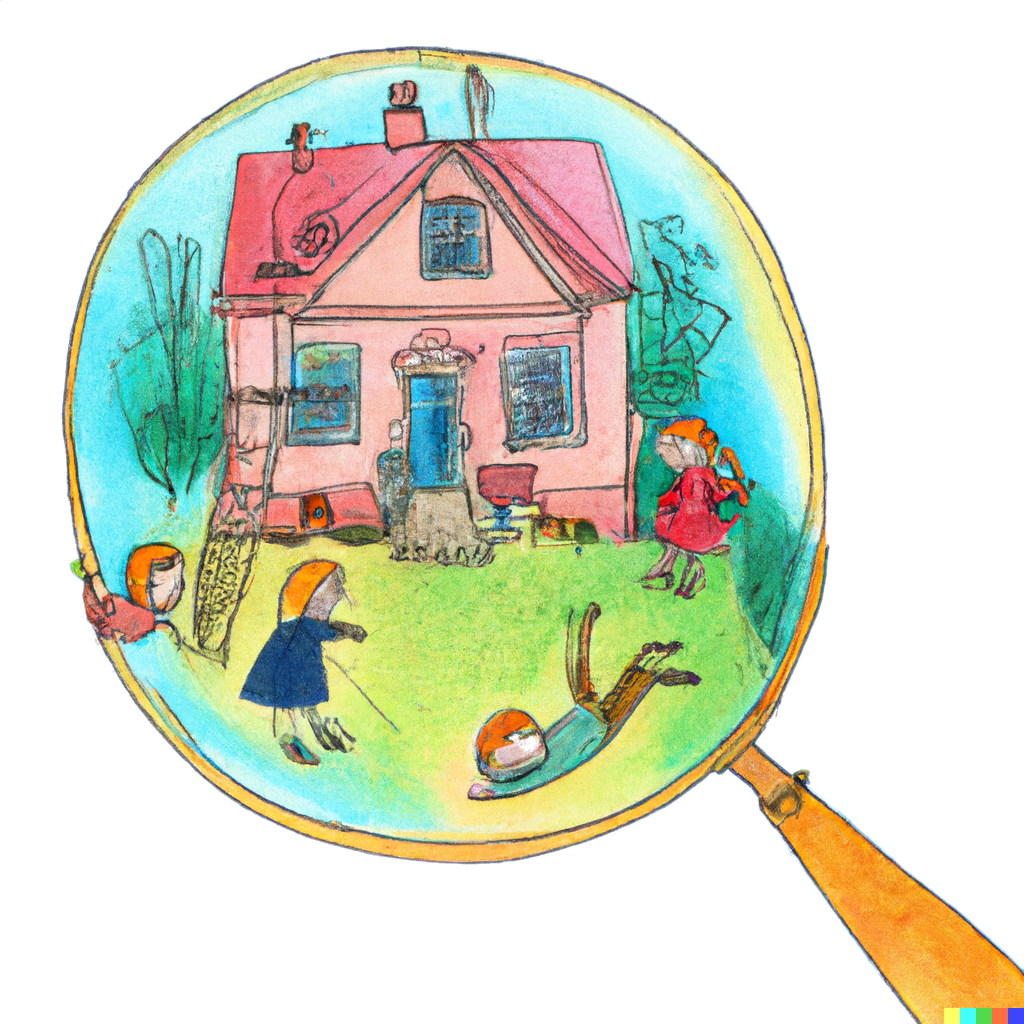Choosing a daycare for your child is an important decision. Your little one will spend all day in someone else’s care: not only are they getting their physical needs met - nourishment, sleep, potty/diapering - but, even more importantly, they develop motor, cognitive, social, and emotional skills. Before the child is even 3 years old, their brain undergoes major developments, so choices now may have lifelong consequences.
My daughter was so young and tiny when I needed a daycare for her, that I was worried literally about everything. Would anyone pick her up if she cries? Will they get angry at the crying? (as my child cried more than average) Will they feed her when she’s hungry? How do I know there is no, knock on wood, abuse? Should I put a hidden camera in her clothes? (an actual idea I had looked into)
This was a very stressful time. Fast forward 3 years later, not only has my daughter been enrolled in a wonderful childcare center and thriving there, I have been elected to the board of directors of that daycare, and I am starting my own childcare center. Things went right for us, but it was by luck, and luck is not a strategy, so I wanted to write this as advice that I wish I had gotten at the time.
Summary for the impatient
To evaluate a childcare provider, we want to make sure the place is
- Safe and healthful
- Enriching and supporting the whole-child
in that order, i.e. problems with safety are “deal-breakers”, and enrichment is where potential compromises lie.

State licensing
The state provides strict regulation and licensing, and performs unannounced audits. A childcare license is not a formality: it is actually checked by an in-person visit. They also take complaints seriously, even anonymous ones - the office would do a surprise visit to follow up on a complaint, give the licensee a deadline to fix, as well as fines. They have the power to cancel the license, thus effectively shutting down the location.
While a license is not a guarantee of quality, it is a high bar. And the best part: audits and complaints are public records. Licensing requirements vary across the states, but in general, they all will strive to ensure safety and an acceptable level of quality of care:
- Max teacher-to-child ratios and group sizes
- Safety of the environment (fire code, dangers, cleanliness)
- Nutrition and safety of the food
- Training and education and background checks for staff
A few notes:
- It is easy to file a complaint, so every center probably has them, but good ones will have few and not severe ones.
- There are very few exceptions to licensing, but they do exist, for example care for less than 4h, or for very few children, or with a parent present, etc. If you hear “we’re exempt”, do not just take their word for it, but check online or the licensing office to confirm the reason is valid. Notably, even “home-based” centers often have to be licensed (these are smaller operations where the owner/teacher lives at the location).
For California, look for licensed daycares here: https://www.ccld.dss.ca.gov/carefacilitysearch/
Accreditation
NAEYC is an old non-profit that provides the best-known accreditation program for early childcare providers. The detailed standard can be found here. It largely overlaps with the California child-care center code and extends it in a few ways to increase quality, such as:
- encourages the continuity of care (same teacher with the child for a long time - teacher “graduates” with the children)
- engagement of local artists to perform for the children.
If your provider does have the accreditation: wonderful. You still need to visit this provider, but extra legwork has been done for you by the auditors ahead of time.
If your provider does not have accreditation: this is okay, most of them don’t, and it is not a bad thing, it just means you need to do due diligence when visiting. There are a few reasons why good providers may choose to opt out of accreditation:
Cost. The annual fee is thousands of dollars, and this money may be better spent on teachers or equipment.
Circumstances. In some areas or at certain times the accreditation conditions may be difficult to meet, e.g. during Covid.
Visit and ask the right questions
You should visit the facility before signing up for your child. Some places seem “nice” online, but you get a different vibe when you are physically there.
During Covid, you might not be permitted inside a classroom, but you might be able to take a peek inside.
When visiting, get the vibe of the place: Is this what you want for your child? Is this what you want for your family? Does this work for you? Does it fit your lifestyle, e.g. what are illness protocols and visit policies?
Regardless of the license or accreditations, you should do your private diligence. Look and ask about safety & health, for example:
- Do I see hazards?
- Does it look clean?
- Is nutrition good? (see the example menu)
- What are emergency protocols?
Even more importantly, during your visit, you want to get an idea about the quality of the care. Ask about
- Time outside (even infants go outside twice a day, weather permitting)
- Staff qualifications
- Children-to-teacher ratio
- Diapering/potty training support
- What is the center’s “philosophy”? (play or academic focus, individual or group focus)
- Does the center practice respectful care?
Deal-breakers
Unless a provider is exempt, you should not use an unlicensed childcare, ever.

The lack of license is no accident - it is a sign the care is
not safe. Risking your child’s health and life (yes!) cannot be a solution to
budgeting. Should something happen, you’ll have limited recourse.
The license ensures that someone is actively monitoring the operation and is
looking out for safety and health of the children. No amount of diligence
by the parent can replace this.
Choices
Childcare choices lie in the zone beyond safety, for example, improved teacher-to-child ratios, visiting local artists, cultural immersion, professional language, music or sports lessons, longer hours, more experienced teachers, flexibility when dropping off, etc.
If your budget is really tight, pick the cheapest licensed provider that will work for you. Look for non-profit or subsidized childcare. Look at the state resources: Early Head Start and Head Start.
More resources
A parent’s best starting point is https://childcare.gov.
In California, the local licensing office also offers helpful resources for parents (CDSS) and licensed childcare search: mychildcare.ca.gov.
